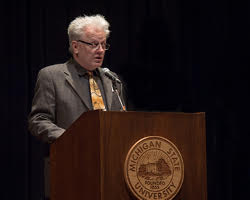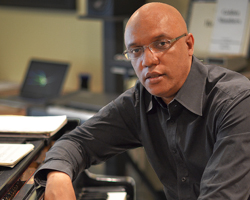Human Trafficking Awareness through Music, Artistic Expression, and Collaboration
- Mark Sullivan, D.M.A.
- Associate Professor and Director, Computer Music Studios
- College of Music

Mark Sullivan, College of Music
Music is a powerful way to tell a story, convey a message, make a point, or spread awareness. Mark Sullivan is knowledgeable and perceptive about the capabilities of music composition. He specializes in the analysis and performance of contemporary music and in studies that relate music to the other arts and society. His work to address human trafficking reflects an intersection of music, artistic expression, societal challenge, engaged scholarship, and community collaboration.
One of Sullivan's upcoming projects is a commemorative concert on January 17 that celebrates the birth of Martin Luther King, Jr., and features MSU Jazz Orchestras, special guests, and an internationally-acclaimed jazz composer and artist performing a world premiere about human trafficking.
"Collective Strength through Collaboration"
As described by the Michigan Human Trafficking Task Force, trafficking is modern day slavery, and Michigan is a source, transit, and destination state for this huge, international criminal enterprise. Although much of the media coverage focuses on sexual exploitation, it is believed that the number of labor trafficking cases in Michigan is at least equal to the number of sex trafficking cases in the statistical breakdown.[1]
Research Needed
One vital area of focus for Jane White, executive director of the Michigan Human Trafficking Task Force, is to inspire more academic research and grant dollars. Human trafficking statistics are inadequate and fewer grant dollars are currently available, demanded, or sought by research scientists.
"It's beyond time to boost the research for human trafficking. We need more data and better data," said White.
For more information:
Jane White, Executive Director
Michigan Human Trafficking Task Force
Jane White is the founder and director of the Task Force. Established in 2008 and administered through MSU's School of Criminal Justice, the organization brings together more than 90 agencies to form a consortium of law enforcement, social service agencies, and community resources for victim support and recovery. White, a former police officer and administrator, has worked determinedly to expand a network that educates communities about the multifarious issues surrounding human trafficking, and advocates for the victims.
White is focused on "collective strength through collaboration," with emphasis on learning, awareness, and action.
"It is great to have the support of the MSU community, because some of our growing awareness is generated from student interest. These young people bring such energy and passion to their advocacy work, and they inspire others to get involved," said White.
College of Music Collaborative Effort
The catalyst for Sullivan's involvement came in 2013 from viewing Cuatro Corridos, a chamber opera based on true events from around the San Diego and Tijuana areas. It includes four ballads illustrating the raw, painful stories surrounding human trafficking from the perspective of survivors. The opera is a collaborative work between Mexican and U.S.-based artists.
Gathering more information led Sullivan to talk with Jane White and become aware of the work being done with the Michigan Human Trafficking Task Force.
"For artists, more informed means getting involved. So that's what I did," said Sullivan.
His initial idea was to bring Cuatro Corridos to MSU's campus. He also worked with White to learn more about the lack of research data available on human trafficking issues, and address the ways arts-based resources could contribute to issue awareness and education.
In October the Task Force hosted Human Trafficking: A Closer Look, a two-day conference in Dearborn. Sullivan presented "Research on Human Trafficking: Creating an Agenda," during a morning session, and a second session "Art Against Trafficking: Problems and Potentials" with Bert Goldstein, director of the MSU Federal Credit Union Institute for Arts and Creativity at the Wharton Center, and Laura Swanson, a documentary film maker and dance choreographer.
While Sullivan was unable to schedule the opera performance for MSU, he proposed that MSU pursue other annual activities centered on human trafficking.
"It's an overwhelming topic that can paralyze people by the intensity of the details," said Sullivan. "So I put a great deal of thought into how we create a work that doesn't dwell on the horror. How can the work illustrate the gravity of these terrible situations while showing that there are solutions, there are ways to get out? And, that survivors can be empowered?"
He set into motion, meeting with College of Music dean Jim Forger, and Jazz Studies director Rodney Whitaker. They responded immediately.
"I've never had colleagues so emphatically support an undertaking like this before," said Sullivan.
Commissioned Work and Heightened Awareness

Grammy Award Winner Billy Childs
Whitaker contacted Billy Childs, an internationally known jazz artist who has won several awards, including a Grammy. Childs agreed to write and perform a new composition on human trafficking. President Lou Anna K. and Dr. Roy J. Simon personally commissioned Childs' piece. The international premiere on January 17 includes a commemorative concert at Fairchild Auditorium celebrating the birth of Martin Luther King, Jr. MSU Jazz orchestras and special guests will perform, and Billy Childs' original work, "Do You Know My Name," will communicate the anguish and isolation of human trafficking in a lyrical, artistic, and audience-inclusive manner.
"It's complex to negotiate a new piece. Rodney Whitaker has done an exceptional job working with Billy Childs. The Jazz Studies faculty and students have been quick to embrace the effort, too. It has been an amazing experience to see how everyone has pulled together," said Sullivan.
"This was an unlikely area for me to explore with regards to human trafficking advocacy, but Mark Sullivan has turned out to be an effective voice for a collaboration that can bridge the harsh realities of human sexual and labor exploitation with music that communicates and opens people to the possibility of awareness, understanding, and activism," said White.
Sullivan firmly believes that arts can play a role in societal awareness and that artists who are educated and informed can create and convey effective messages that have significant impacts.
"Working with the community, and hearing from those involved in human trafficking from multiple perspectives—survivors, human rights activists, and law enforcement among them—leads our students and faculty to make informed decisions about research, scholarship, and the educational resources that can reach others," said Sullivan. "There are mutual benefits across the spectrum."
"I've learned so much. I've been in meetings that include representatives from the FBI, Homeland Security, foster care, Catholic nuns, cops, survivors, and volunteers. I'm totally humbled by their efforts. It's energizing to be with them in that context. And it's reciprocal energy; we all want to spread awareness and address the problem," said Sullivan.
Intractable Problems, Research, and Systemic Change
According to the Task Force, real statistics regarding the number of sex and labor trafficking victims are difficult to assess because the crime takes place in secretive or underground operations. The crimes are often misidentified, or missed entirely, because of the nature of the conduct. More research and more reliable data can lead to different decisions when it comes to committing resources.
"Intractable problems often present such overwhelming obstacles that it's hard to sort out where to focus your efforts. To leverage systemic change you need the data to make informed decisions. Instead of rhetoric, we need to commit the resources toward a victim-centered approach for human trafficking," said Sullivan.
Jazz: Spirituals, Prayer, and Protest Concert
January 17, 2016
Fairchild Theatre, MSU Auditorium
3:00 pm or 7:00 pm Performances
Featuring Grammy-winning Billy Childs as Guest Composer
Free Admission, but tickets required
MSU Commemorative concert celebrating the birth of Martin Luther King, Jr., featuring Jazz Orchestras and special guests performing a world premiere about the plight of human trafficking.
Do You Know My Name?
This new work, by Grammy-winning composer Billy Childs, was commissioned by Drs. Lou Anna K. and Roy J. Simon. The concert and Billy Childs' residency are generously sponsored by Ken and Sandy Beall.
For more information
Sources
- Michigan Human Trafficking Task Force, Information on Human Trafficking, Jane White, November 2015, http://mhttf.blogspotcomReturn to text
- Written by Carla Hills, University Outreach and Engagement
- Photograph of Mark Sullivan courtesy of MSU Communications and Brand Strategy
- Photograph of Billy Childs courtesy of BillyChilds.com